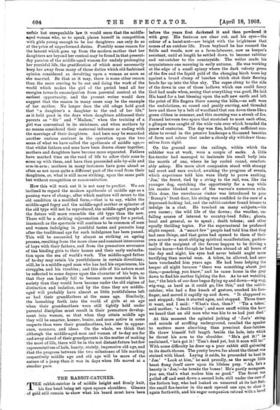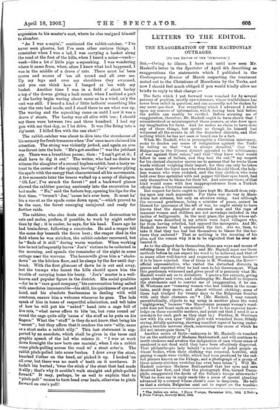THE RABBIT-CATCHER.
THE rabbit-catcher is of middle height and firmly knit, his fine head being set upon square shoulders. Gleams - of gold still remain to show what his beard must have been
before the years first darkened it and then powdered it with grey. His features are clear cut, and his eyes—the colour of a hazel-nut—are bright with the brightness that comes of an outdoor life. From boyhood he has roamed the fields and woods, now as a farm-labourer, now as keeper's assistant, until at length he settled down to become rabbiter and rat-catcher to the countryside. The writer made his acquaintance one morning in early autumn. He was working at the edge of a small spinny where the dark velvety green of the fire and the liquid gold of the changing birch trees lay against a broad clump of beeches which shot their flaming heads far up into the blue sky. The copse clung to the side of the down in one of those hollows which one could fancy God had made when, seeing that everything was good, He laid His hand for a last blessing upon the soft new earth and left the print of His fingers there among the hills,—so soft were the undulations, so round and gently curving, and threaded here and there by a belt of woodland that ran down them like a green ribbon in summer, and this morning was a streak of fire. Framed between two spurs that stretched to meet each other, a glimpse was caught of the wide vale over which brooded the peace of centuries. The day was fine, holding sufficient sun- shine to reveal in the pensive landscape a thousand beauties of form and colour that under a cloudy sky withdraw them. selves from sight.
On the ground near the railings, within which the rabbiter was at work, were a couple of sacks. A little fox-terrier had managed to insinuate his small body into the mouth of one, where he lay curled round, comfort- ably asleep. His more alert companion stood with stumpy tail erect and ears cocked, awaiting the progress of events, which experience told him were likely to prove exciting. 'Joe,' the ferret, tied by a string to the rail, was, like the younger dog, snatching the opportunity for a nap while his master blocked some of the warren's numerous exits. This done, the unwelcome visitor was introduced to poor 'Bunny's' front door, his string was confided to the care of a depressed-looking lad, and the rabbit-catcher found leisure to indulge in a chat. He touched on many subjects,—his own career ; the wild life of the downs ; the weather, un• failing source of interest to country-bred folks ; ghosts, local and general, so to speak ; death tokens; and other equally thrilling topics. For the supernatural he professed slight respect. A "smart few" people had told him that they had seen things, and that gates had opened to them of their own accord—a most obliging spiritual manifestation, particu- larly if the recipient of the favour happen to be driving a restive horse—but though he had been abroad at all hours of the day and night, his eyes had never beheld aught more terrifying than mortal man. A token, he allowed, had once been vouchsafed him years ago. He had been helping the keeper all night because "there was something about just then,—poaching, you know," and he came home in the grey dawn to find his mother lighting the fire. As he sat watching her, " the latch of our door began flying up and down—wig-wag, wig-wag, as hard as it could go, like this," and the rabbit. catcher, who had a fine knack of gesture, crooked his fore- finger, and moved it rapidly up and down. "It clappered so, and stopped; then it started agen, and stopped. Three times it went, and I said: What's that, then ? ' ''Tis a token,' said mother, a death token' ; and sure anuff within the hour we heard that an old man who was kin to us had just died."
At this moment the agitated jerking of ' Joe's ' string, and sounds of scuffling underground, recalled the speaker to matters more absorbing than prescient door-latches. He threw himself full length beside the hole, into which he thrust his arm to the shoulder. "He's got it!" he exclaimed, "he's got it ! 'Tisn't dead yet, but it soon will be!" With some difficulty he drew up a poor rabbit still quivering in its death-throes. The pretty brown fur about the throat was stained with blood. Laying it aside, he proceeded to haul in Joe.' "Look at him," he said proudly, as the savage little beast flung itself anew upon its lifeless prey. " Ah, he's a beauty is 'Joe,'—he breaks the bones ! He's partly mongoose, you see, that's what makes him so good." The ferret was pulled off and sent down a second hole, still under the care of the forlorn boy, who had looked on unmoved at its last feat; the small fox-terrior in the sack opened one eye, to close it again forthwith, and his eager companion retired with a bored exPiefision to his master's coat, whete he also resigned himself to slumber.
"As I was a-sayin'," continued the rabbit-catcher, "I've never seen gbostes, but I've seen other curious things. remember when I was a lad, I was carrying a basket along the road at the foot of the hills, when I beard a noise—week- week—like a lot o' little pigs a-squeaking. I was wondering where it came from, when, afore I knew what had happened, I was in the middle of a drove o' rats. There must ha' been scone and scores of 'em all round and all over me. Up my legs and over my shoulders they swarmed, and you can think how I banged at 'em with my basket. Another time I was in a field o' short barley a-top o' the downs giving a look round, when I noticed a part o' the barley begin waving about same as in a wind, on'y the rest was still. I heard a kind o' little hollerin' something like what the rats had made,- and I stood there to see what was up. The waving and the squeaking came on until I saw it was a drove o' stoats. The barley was all alive with 'em ; I should say there were between two and three hundred. I had my gun with me that day, so I let drive. It was like firing into a rig'ment. I killed five with the one shot!"
The rabbit-catcher was about to dive into the storehouse of his memory for fresh treasures when Joe' once more claimed his attention. The string was violently jerked, and again an arm was thrust into the hole. "He's got another!" was the jubilant cry. There was a breathless pause; then: "I can't get at it; I shall have to dig it out." The writer, who had no desire to witness the slaughter of a second hapless rabbit, beat a hasty re- treat to the corner of the spinny, leaving 'Joe's' master plying the spade with the energy that characterised all his movements. A few moments later the breeze wafted up a scrap of dialogue. "Oh Lor', rve struck the ferret !" and a backward glance showed the rabbiter peering anxiously into the excavation he had made. "No," said the forlorn boy, opening his lips for the first time, " Iwurn't'Joe,' cause he's over here. It must ha' bin a roe-ut as the spade come down upon,"—which proved to be the case, the ferret emerging uninjured and ready for further raids.
The rabbiter, who also deals out death and destruction to rats and moles, prefers, if possible, to work by night rather than by day ; it is cooler, he says, for his head. Years ago he had brain-fever, following a sunstroke. He and a reaper fell the same day beneath the fierce heat ; the reaper died in the field where he was stricken, the rabbit-catcher recovered, but he "finds of it still" during warm weather. When working late he not infrequently leaves 'Joe's' victims to be collected in the morning, and spends the remainder of the night in some cottage near the warrens. The housewife gives him a "shake- down" on the kitchen floor, and he sleeps by the fire until day- break. With the first glimmer of dawn he is out and away, lest the tramps who haunt the hills should spare him the trouble of carrying home his booty. 'Joe's' master is a well- known and popular figure in the district. His social qualities —for he is "rare good company," his conversation being salted with anecdotes innumerable—his skill, his quickness of eye and hand, and his absolute fearlessness in dealing with wild creatures, ensure him a welcome wherever he goes. The lads speak of him in tones of respectful admiration, and tell tales of how he will put his " naked " hand. into a cage full of live rats, "what never offers to bite 'an, but runs round an' round the cage quite silly 'cause o' the stuff as he puts on his fingers." What the " stuff " is they do not know, that being his " secret" ; but they affirm that it renders the rats "silly, same as a stoat meka a rabbit silly." This last statement is sup- ported by an anecdote, which shall be given in the terse and graphic speech of the lad who relates it. "I wur at work ,down foreright the new barn one marnin', when I sin a rabbit come pitch-polling across the road wi' a' stoat arter'n. The rabbit pitch-polled into some bushes. I dray away the stoat, .knocked t'other on the head, an' picked it up. I looked 'un all over, but there vras no mark o' teeth on it nowheres. It hadn't bin hurted ; 'twos the stink o' the stoat that had made Wanly ; that's why it couldn't walk straight and pitch-polled forrard." It may, perhaps, be as well to explain that to "pitch-poll" means to turn head over heels, otherwise to pitch forward on one's poll!







































 Previous page
Previous page